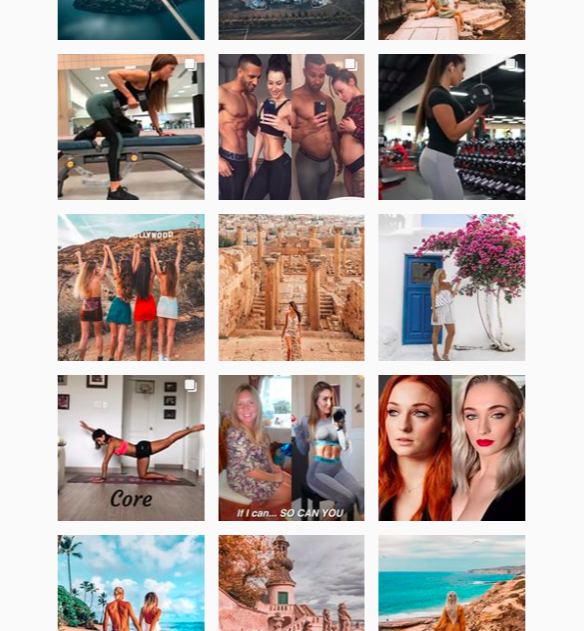Following on from World Mental Health Day last month, I thought I’d take a closer look at the relationship between social media and our mental-wellbeing. Often in the news social media gets a bad press, regularly being cited as one of many contributing factors to blame for the worsening state of young people’s mental health. 40% of the world’s population use social media, with the average person spending two hours a day tweeting, sharing, liking, disliking, commenting on these platforms.
I believe the generation below me have all grown up worryingly preoccupied with their alter internet egos. The few 14 year olds that I do know personally are all desperate to constantly project a perfect (and much older looking) image of themselves online: edited with filters, AR and often, sadly, going out of their way to hide their faces if they feel they don’t look good enough for the ’gram.
Here’s my perspective on the pros and cons of social media:
False reality
Instagram is great, if you bear in mind that the images being projected to us are crafted works of art, not a true reflection of reality. As a portfolio of beautiful and exotic images, it is wonderful. As a supposedly accurate representation of the perfect life a person is leading, not so wonderful. I personally believe that platforms such as Instagram can put an awful lot of pressure on young impressionable people (both girls and boys), with its readily accessible filters, face-altering features and editing tools. According to a survey conducted by Scope, half of 18- to 34-year-olds say it makes them feel unattractive and inadequate. It doesn’t take a rocket scientist to figure out why this is – how can we compare our real natural selves to a digitally enhanced vision of someone with a dog filter altering their natural features?
“Instagram can put an awful lot of pressure on young impressionable people… with its readily accessible filters, face-altering features and editing tools”
Have a scroll through your Instagram feed and if it’s anything like mine it will be littered with an assortment of insanely attractive models, who all conform to one body type, accompanied by posts advertising or endorsing supplements or some sort of “healthy living” programme. I’m sure you’ve all seen the frankly unnecessary controversy and backlash one influencer faced for her paid partnership with Listerine, claiming she even received death threats over it.
Obviously nobody wakes up looking this perfect, perfectly made up, with a breakfast (of tortilla wraps with a strawberry placed on top) balanced at the foot of the bed. Or, if there is anybody that actually does start their morning looking this poised, then fair play to you. The whole thing works much better if you take it with a pinch of salt and remember we are being presented with a crafted image of what a perfect morning could look like in a idealised world. In much the same way that an advert in a glossy magazine would use an attractive model, airbrushed and staged so as to look perfect.
Self- esteem
I am guilty of constantly comparing myself to others, a problem that is magnified a thousand times over on social media. Something recently I have struggled with is the anxiety that ensued after leaving university. Speaking to others, I am reassured that many people feel this way and I am in fact not alone. Yet in the distorted confines of social media, it is easy to trick yourself into believing that everyone else is living a perfect life, free of the doubts and worries that are inevitable when things change.
I also am a great sufferer of FOMO. Knowing that my friends are all out undoubtedly having the best time ever without me causes a great deal of paranoia at the prospect of missing out. Waking up the next morning to social media channels plastered with pictures of their fun shenanigans only serves to heighten it.
However, I do also wonder how much of this we can really blame social media for? Interestingly, one BBC article suggests that a social media does no more damage than say, a mirror, for someone who is insecure and lacking confidence.
Body positivity
So to play devil’s advocate, social media is also is an amazing tool for inspiring and motivating us. Across social platforms, brilliant body positivity movements are popping up, encouraging members to share and embrace their perceived body hang-ups. Part of this is sharing what they deem to be unattractive about themselves on social media to tackle their body demons head on.
There are many Instagram accounts that strive to teach women and men to embrace their flaws, which is fantastic. One notable movement is Jameela Jamil’s #IWeigh, a revolt against a picture of the Kardashians which a fan account had helpfully (not) labelled each sibling with their weight in kilograms. #IWeigh, therefore, encourages people to list their achievements, what they’ve overcome that week, the promotion they have recently received or anything else they are proud of rather than reducing themselves to a mere number on a scale.
Connecting people
Another one of the more obvious perks of social media is its incredible power to connect people. Personally, I would be lost if someone (god forbid) were to rid me completely of my Facebook. My social calendar relies heavily upon events that I have been invited to on Facebook. And how else would family friends be able to keep tabs on me and feed back any embarrassing pictures they’d seen of me online…
Social media is also so handy to keep in contact with friends halfway around the world and to see all the amazing and exotic places that my travelling friends are visiting.
Discovering a world of possibilities
Especially since starting at Traverse and following some of our campaigns, I increasingly sit, turning green with envy, while scrolling through accounts dedicated to travel. I am often transported to far-flung places that I’ve never heard, catapulted into jungles, deserts, caves or oceans all from the comfort of my sofa. Destinations I have never even heard of before become increasingly tangible, especially when scrolling through hashtags such as #TravelTuesday and seeing the vast and varied destinations that appear. What’s more, is the ease with which we can then communicate about these locations, swapping anecdotes and fond memories, asking for recommendations, sharing hints and tips.
“I am often transported to far-flung places that I’ve never heard, catapulted into jungles, deserts, caves or oceans all from the comfort of my sofa”
Social media is a wonderful thing. I for one can’t imagine my life without it. While it does get blamed for being largely responsible for the deteriorating mental well-being of young people and for denting self-confidence, I don’t think we can solely blame social media or the time we spend glued to our phones.

Charlotte has been a Marketing Executive for the past year now. Prior to this she spent three years at Bristol University studying English Literature.

Comment